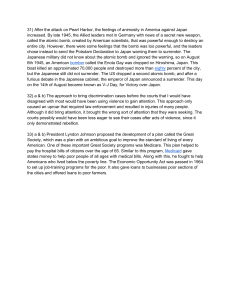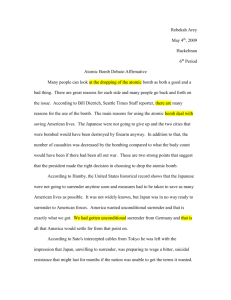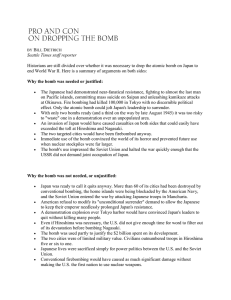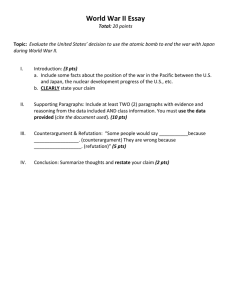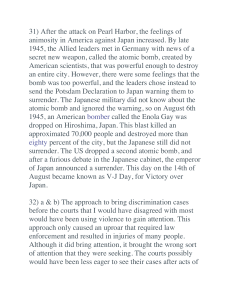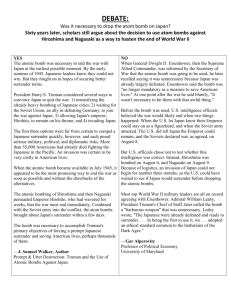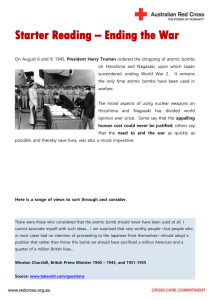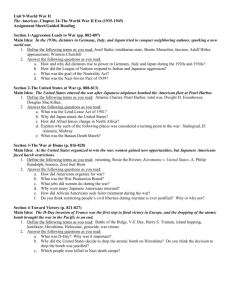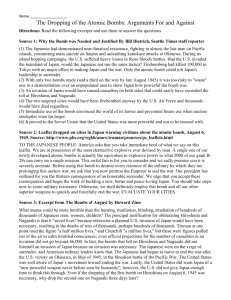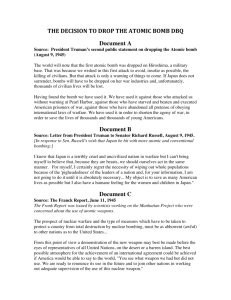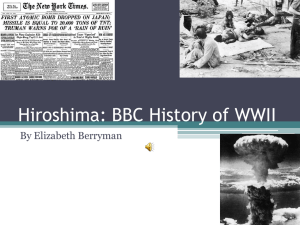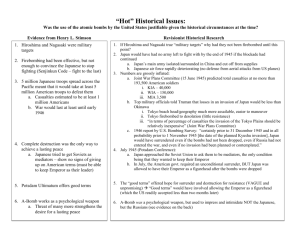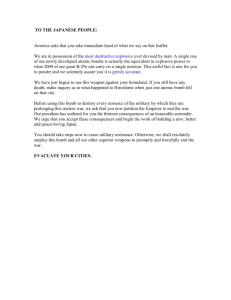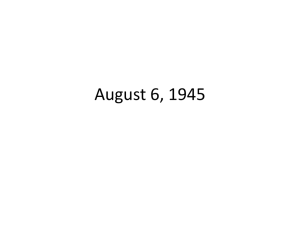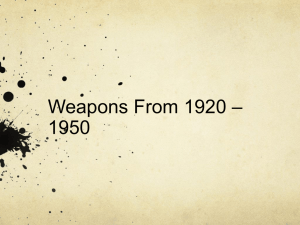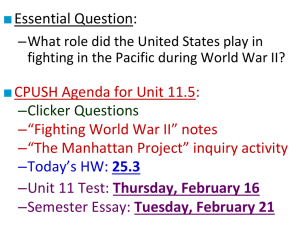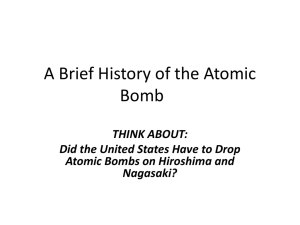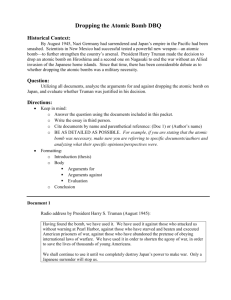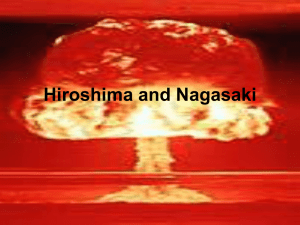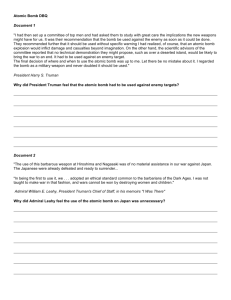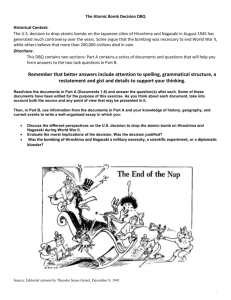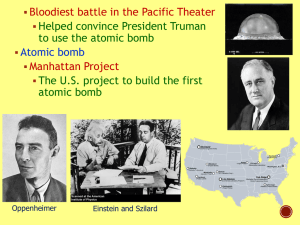TCI Assessing the Bomb
advertisement
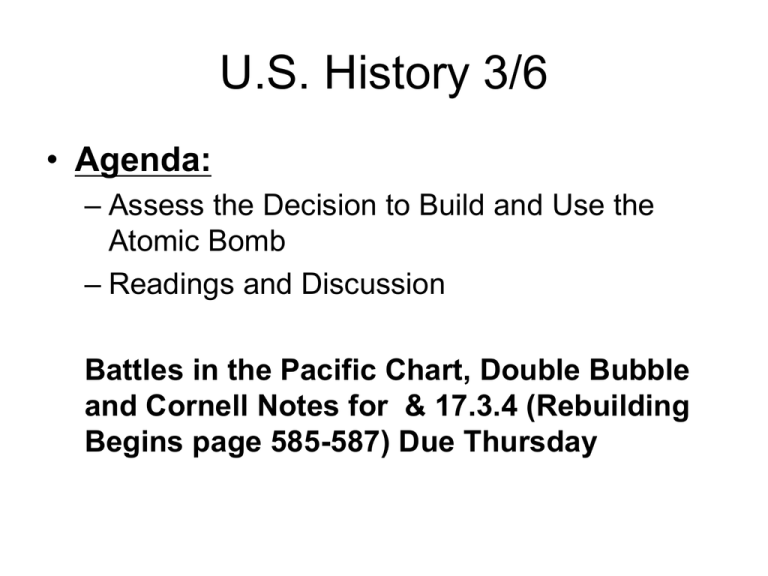
U.S. History 3/6 • Agenda: – Assess the Decision to Build and Use the Atomic Bomb – Readings and Discussion Battles in the Pacific Chart, Double Bubble and Cornell Notes for & 17.3.4 (Rebuilding Begins page 585-587) Due Thursday U.S. History 3/7 • Agenda: – Assess the Decision to Build and Use the Atomic Bomb – Readings and Discussion – T Chart – Response Battles in the Pacific Chart, Double Bubble and 17.3. Assessing the Decision to Build and Use the Atomic Bomb • Get into Pairs: – Desk Must be side by side – Pick up a reading in the back of the room, each students will get their own packet. – On a sheet of paper title it “Decision to build and use the Atomic Bomb” (Class Activity) – Bonus Points for those who are ready first!!! Decide 1.Get into the mindset of 1939. 2.Read your choices. 3.Discuss with your partner. 4.Pick your choice. 5.Write a rationale underneath your notes. To Build or Not to Build? • 1939, President Roosevelt approved the building • Manhattan Project included the efforts of over 600,000 Americans • Cost $2 billion VE Day..yay!!!!! • President Roosevelt dies April 12, 1945 • Germany surrenders – After Hitler’s suicide • May 8, 1945 – allies win in Europe Manhattan Project • What is it? • Tell me about the testing? • Who was involved? • Any other facts? To Drop or Not to Drop? • August 6, 1945- the Enola Gay dropped “Little Boy” over Hiroshima = 80,000100,000 deaths • August 9- Nagasaki = 70,000 deaths • Japanese would stop within five days…(officially signing the surrender Sept. 2) Atomic Bombs: Hiroshima Nagasaki • August 6, 1945 • “Little Boy” dropped by the Enola Gay. • Killed 80,000 people including JapaneseAmericans, Allied prisoners of war, and refugees. • No Japanese surrender. • August 9, 1945 • Industrial City • “Fat man” Killed about 80,000 not counting those affected with radiation and injuries. • Japanese did not surrender. Hiroshima vs. Nagasaki • • • • Little Boy 4 tons 15,000 tons of TNT Exploded 1,900 feet above the city • Cloud reached 40,000 feet • • • • Fat Man 4.5 tons 21,000 tons of TNT Exploded 1,800 feet above the city • Cloud reached 60,000 feet VJ Day and Japanese Surrender • VJ Day was the celebrated day of victory against the Japanese, August 14, 1945. • Sept. 2, 1945, Japanese surrendered when their emperor was finally recognized on the battleship Missouri. Effects of the Bomb: • • • • • Blasts = 100 million degrees People vaporized, bodies left shadows People’s burned skin peeling in red strips Buildings completely destroyed Radiation poisoning led to future deaths How did the U.S. occupation of Japan impact its future? For later – think about the righteous of dropping the bomb? Are civilians an appropriate target of war? Right or Wrong? • Historians still debate this today • Sides are split • By 1990, the U.S. and the USSR had 70,000 nuclear weapons in their collective nuclear arsenals. • 10 countries have nuclear arsenals/abilities: U.S., U.K., France, USSR, China, Pakistan, India, North Korea, Israel, Iran For the Dropping of the Bomb President Truman "Having found the bomb we have used it. We have used it against those who attacked us without warning at Pearl Harbor, against those who have starved and beaten and executed American prisoners of war, against those who have abandoned all pretense of obeying international laws of warfare. We have used it in order to shorten the agony of war, in order to save the lives of thousands and thousands of young Americans.” General Leslie Groves “As to the present war, there was a feeling that no matter what else might happen, we now had the means to insure its speedy conclusion and save thousands of American lives.” Secretary of War Stimson "These two heavy blows have fallen in quick succession upon the Japanese and there will be quite a little space before we intend to drop another. During that time I hope something may be done in negotiating a surrender. I have done the best I could to promote that in my talks with the President and with Byrnes and I think they are both in full sympathy with the aim." Against the Dropping of the Bomb Albert Einstein "I made one great mistake in my life…when I signed the letter to President Roosevelt recommending that atom bombs be made; but there was some justification the danger that the Germans would make them." General Eisenhower "During [Sec. of War Stimson’s] recitation of the relevant facts, I had been conscious of a feeling of depression and so I voiced to him my grave misgivings, first on the basis of my belief that Japan was already defeated and that dropping the bomb was completely unnecessary, and secondly because I thought that our country should avoid shocking world opinion by the use of a weapon whose employment was, I thought, no longer mandatory as a measure to save American lives. It was my belief that Japan was, at that very moment, seeking some way to surrender with a minimum loss of 'face'. The Secretary was deeply perturbed by my attitude..." Debrief Respond to each in one paragraph: 1. Was the decision to drop the bomb a military necessity? If not, was it justifiable for a reason besides military necessity?
